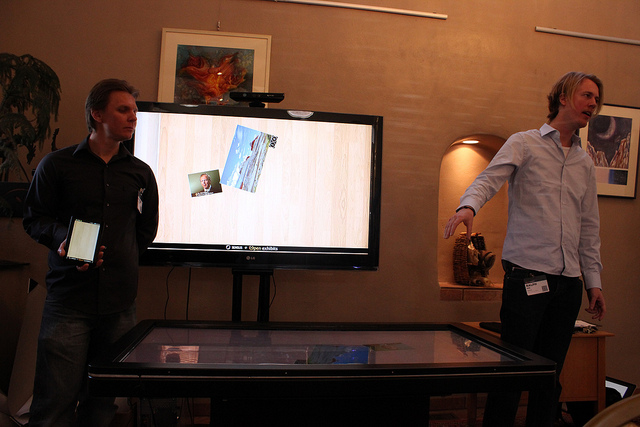“Sensus” – Making Exhibits Social and Sharable

Ralph Das is the Chief Technical Officer of Amsterdam-based Sensus, an innovative company focused on the development and application of multi-touch technologies. He spoke at the 2011 Open Exhibits Summit about the limitations of local networks and Sensus’ plan to overcome those limitations to enhance the museum exhibit experience.
Primary challenges include:
- Local networks are confusing
- Networks share files, not experiences, they’re not social by nature
- There are many different network formats
- Devices exist in bubbles of proprietary technology which don’t play well with other devices over a network
Mr. Das focused on the potential for sharing within the exhibit experience, and noted that “going social for exhibits is very hard.” To overcome this challenge, Sensus has developed a “shared area,” a “large display with high resolution” coupled with Wi-Fi networks and personal devices. Sensus designed what Das called a very simple application that allows different devices to communicate with each other without concern for the nature of their operating systems or the networks they share.

“As long as you have the application, it just works,” said Mr. Das. This technology allows a visitor to interact with the multitouch table then take objects from the table with them on their personal device, such as a smartphone, tablet PC or other network display device. This gives the exhibit a freer and more interactive nuance by adding mobility.
The Sensus platform also allows for museums to network their collections and share resources and objects over the internet via Sensus’ dedicated application.
Mr. Das said the technology is still in the development phase, adding, “We’re ping-ponging — back and forth — to develop this application; that’s why we’re here [at the Open Exhibits Summit].”
According to Das, the ultimate goal is a clean solution. “We want to keep it very simple,” Das said, adding, “Why not let the technology talk to everything — all devices? That’s what this does.”
by Donovan Kabalka ![]() on March 11, 2011
on March 11, 2011